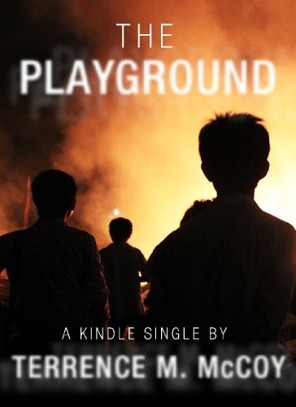"The Playground" by Terrence McCoy (Cambodia 2009-11) Reviewed in The Washington Post
“The Playground by Terrence M. McCoy (Cambodia 2009-11) was reviewed in the Washington Post today, Sunday, May 11, 2012 by Steven Levingston.

Levingston writes:
Kindle Singles is a 15-month-old e-book venture from Amazon that strives to publish original fiction and nonfiction works at Goldilocks length: not too long, not too short but just right. Its Web site lays out the ambition: “Compelling Ideas Expressed at Their Natural Length.” The books, as short as David Baldacci’s 15-page story “No Time Left” or as long as Dean Koontz’s 102-page “The Moonlit Mind,” are vetted, accepted (or rejected) and edited by David Blum and put on sale at the very modern price of 99 cents to $4.99.
Kindle Singles isn’t just for brand-name authors. It serves its greatest purpose by showcasing the work of unknown authors of exceptional ability, such as the journalist Terrence M. McCoy. His just-released book, “The Playground” is an ire-inspiring account of cash-rich Chinese corporations sweeping into Cambodian villages at the urging of the despotic Hun Sen government and sweeping out the locals to make way for five-star hotels and shopping malls. It’s a tale of tag-team tyranny over the defenseless. The work’s length – longer than many magazine articles but shorter than most books – and its strong storytelling are perfect for a few commutes on the Metro and, more important, for engaging the uninitiated in an issue of growing global importance: the ugliness that arises from the lust for economic development in certain parts of the world. At $1.99, the price of enlightenment is low.
McCoy became fluent in Khmer during a two-year stint with the Peace Corps in Cambodia and is now completing a one-year Master’s program in journalism at Columbia University. For his Master’s project, he returned to Cambodia to investigate the tactics of Chinese corporations. His crisp, vivid narrative depicts the one-sided battles that rage between developers intent on having their way with the less-powerful and villagers hoping to cling to their homes. In one village, “Soldiers had Tasered and sent to prison dozens of villagers – including two children – with their heads bashed,” McCoy writes, adding that one woman, distraught over her eviction, killed herself by leaping off a bridge over the Mekong River.
What separates McCoy’s book from other tales of authoritarian capitalism run amok is his discovery of a unique form of protest – led by a most uncommon rebel. During his Peace Corps years, McCoy writes, “I’d gotten to know hundreds of Cambodians, dozens of them intimately, and thought I’d met every sort of Khmer personality the country had to offer. But then I met Vanny.”
Vanny Tep is a former fashion model whose “life, she says, has no space for vanity” and who, at 32, “has become the de facto leader of a [Phnom Penh]-based grassroots movement against the government, violent land eviction, and development itself,” McCoy writes. He tags along with her to a meeting of rebels in the village of Boeung Kak, a fishing village once rich in freshwater fish and water buffalo, and now “something out of a post-apocalyptic film, barren and cragged” after nearly two-thirds of its 20,000 residents have fled because of violence and intimidation. The Boeung Kak rebels at the meeting are not the angry men you’d expect but a group of about 20 boisterous women.
A few years ago, Vanny had a realization about the power of women protesters. While Cambodian soldiers willingly whack the skulls of male resisters, they hesitate before women. “It’s the Khmer way,” McCoy writes. “A man would be shamed if he publicly beat a woman.”
For Vanny, the route to effective protest was obvious: “I need to gather all the women,” she thought, and soon she had a resistance movement of young and old Cambodian women wearing Khmer scarves around their necks, waists or bandana-like around their heads as a symbol of resistance. Their protests befuddled the police and prevented violence. It also publicized their cause, even though the outlook for containing China’s corporate aggression is uncertain.
In McCoy’s adroit hands, the story doesn’t end on the public battlefield but goes inside the home, where the female protesters are also rattling Cambodian domestic traditions. Women whose lives typically revolve around child care, cooking and cleaning have found a new sense of power. Husbands, used to subservient wives, grumble and adjust. “This clash of tradition and gender equality,” McCoy writes, “represented not only a profound shift in culture, but another wrinkle in the story of development.”
No comments yet.
Add your comment